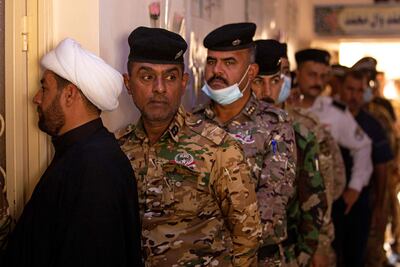Iraqis in Basra are sceptical about the likelihood of change, as Sunday's early parliamentary election approaches, despite promises by politicians of a better future.
Residents of the southern province have suffered for years from chronic unemployment, poverty and poor service delivery, even though Basra is rich in natural resources and is Iraq’s main oil region.
Many blame the situation on poor governance and corruption.
“The streets of Basra are divided, one half is reluctant to vote because of neglect by previous governments. The other half is in favour of change and believe their voice can combat corruption,” Karima Mubarak, a human-rights activist from Basra, told The National.
“I’m one of the optimists who believes in the necessity of this election and independent [representatives] who can be relied upon for change,” she said.
However, Ms Mubarak said, “most people in Basra believe their vote will not change the quota system, known as Muhasasa”.
Residents believe that “even if they nominate an honest candidate he or she will join parliament’s larger coalitions and his efforts will be in favour of the corrupt elite,” she said.

The Muhasasa system, which emerged after the 2003 US-led invasion that ended Saddam Hussein's dictatorship, ensures senior positions in government are divided among ethno-sectarian groups.
Basra has been one of the main hubs of anti-government protests, with residents rallying to demand jobs, better public services and an end to corruption since 2018.
These demands were taken up by protesters elsewhere when mass demonstrations erupted in other parts of southern Iraq and the capital, Baghdad, in October 2019.
The protesters also demanded an overhaul of the political system, including early elections under a new electoral law that allows independent candidates to enter parliament.

Prime Minister Mustafa Al Kadhimi, who took office in May last year after the protests forced the resignation of his predecessor, Adel Abdul Mahdi, promised to meet their demand for an early election.
The electoral law was ratified by parliament in Novemeber.
“I’m not sure what to think of this year’s early vote, we have been let down many times by the authorities for years, but then if we don’t vote then no changes will occur,” said Haider Al Khafaji, 25, an engineer from Basra.
“I will go and vote because at least I’m doing something to help my country, even if nothing changes, which will probably be the case,” he said, adding that residents of Basra “just want to live in peace”.
Sara Hussein, 26, an unemployed lawyer, said she would not vote because she had lost hope in the system.
“What’s the point of holding elections when the political elite will decide among themselves the country’s future,” Ms Hussein said. “Some members of my family will go to the polling stations and vote but I will stay home. I don’t see the purpose in voting.”
Mohammed Al Tai, a former MP from Basra who is running on an independent ticket, believes that the turnout will be higher than in previous elections because of the people's desperation to see change.
“This time around the public’s voices will be heard. However, the majority of voters that we are meeting are disappointed and let down by the political coalitions and feel that there is no point in voting,” Mr Al Tai told The National.
“We have time and time again explained to the public how important their vote is to change the system,” he said.
Mr Al Tai said the changes to electoral laws allowed independents to deliver results for voters .
“If the public decides to vote then we can have independent voices in parliament who want to actually create change and meet their demands,” he said.
Mr Al Tai’s electoral programme consists of three points: Pushing for Basra’s independence from Baghdad, creating an independent council to rebuild Basra, and establishing a centre for youth employment.
“We believe these three points will solve the majority of Basra’s problems,” he said.















